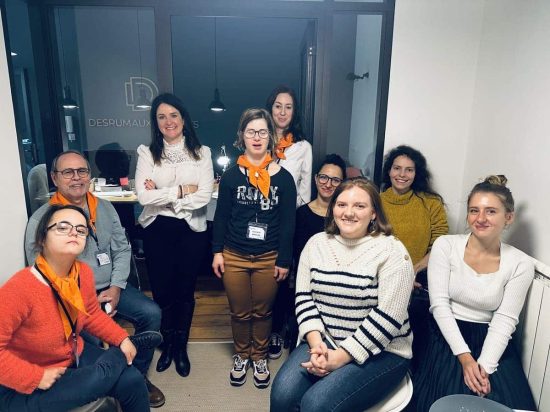At DESRUMAUX AVOCATS, we believe that diversity is the fabric of our society, and inclusion its driving force.
On November 20, 2023, we were honored to welcome the Centre Ressources Régionales Trisomie 21 (CRR Trisomie 21) to our premises, thanks to the Communauté des Entreprises s’engagent Gironde. This flagship association in New Aquitaine symbolizes an unwavering commitment to supporting people with Down’s syndrome, from childhood to adulthood, to enable them to choose and live an integrated life within society in an ordinary environment.
CRR Trisomie 21 works to make access to the mainstream a reality for people with intellectual disabilities.
A questionnaire devised by the Center brought us face to face with an often overlooked truth: individuals with Down’s syndrome have the same rights and duties as everyone else. Integrating these people into the world of work is not just a question of social responsibility; it’s an opportunity for growth and mutual enrichment.
The benefits for companies are manifold, ranging from opening up employees’ minds to adding deep-rooted human values within the company.

In concrete terms, what are the benefits for a company of hiring people with intellectual disabilities?
Integrating colleagues with Down’s syndrome reveals an unexpected richness. These valuable interactions refocus our perspectives, inviting us to move away from egocentricity and embrace a corporate culture based on empathy and mutual support.
Decentralization of the Employee from Himself :
By sharing their daily lives with colleagues with Down’s syndrome, employees discover a deeper dimension to their work. This experience leads them to consider the perspectives of others, fostering a spirit of collaboration and open-mindedness. They learn to value the unique contributions of each individual and to see beyond their personal concerns, creating a more harmonious, group-centred workspace.
Autonomy and Competence:
With the assistance of CRR Trisomie 21, these employees are not only competent, but also endowed with the ability to become autonomous in their tasks. This autonomy is the result of a workstation carefully prepared and adapted to their needs, enabling them to integrate smoothly and productively into our teams.
Financial benefits for the company :
A commitment to inclusion also offers tangible benefits. Companies that hire people with intellectual disabilities can access financial incentives. These incentives encourage the adoption of best practices in inclusion and reduce the costs associated with adapting workstations.
De-escalating conflicts :
The presence of colleagues with Down’s syndrome has a calming effect on the workplace. Their approach to life and daily challenges, often marked by exemplary resilience, inspires and facilitates conflict resolution. Their interactions tend to reduce tensions and promote constructive dialogue.
Establishing Benevolence:
Caring is not just an abstract concept, but a tangible reality in an inclusive company. Awareness of the challenges and successes of colleagues with Down’s syndrome nurtures a mutually supportive environment. This manifests itself in increased patience, attentive listening and a willingness to help each other.
Add Human Values :
Hiring people with Down’s syndrome is synonymous with introducing a set of human values into the company’s DNA. These values, such as authenticity, commitment and perseverance, become pillars of the corporate culture, influencing day-to-day interactions and decision-making at all levels.
In short, the inclusion of people with Down’s syndrome is not just a socially responsible approach, it’s a lever for cultural transformation that can enrich your company in every way. It reshapes teamwork, strengthens the internal social fabric and propels the company forward as a forerunner of a profoundly inclusive society.
To integrate a person with an intellectual disability into your company, and in particular a person with Down’s Syndrome, you need to take a structured, well-thought-out approach.
Here’s how it works:
Identify appropriate tasks :
Start by determining which tasks within your company would be suitable for an employee with Down’s syndrome, taking into account his or her abilities and level of autonomy. The aim is to strike a balance between the company’s needs and the individual’s skills. The tasks chosen must enable the employee to feel valued and make a significant contribution to the team.
Adapting the Workstation :
Once the tasks have been identified, adapt the workstation to make it accessible. This may involve physical adjustments, such as workspace ergonomics, or process modifications, such as simplifying instructions. The use of visual aids, clear task sequences and cues to help structure time and activities are effective strategies. It may be a good idea to set up a sequencing of tasks to be carried out in the form of photographs or visuals to help this person in his or her work.
Training and support :
Make sure the employee receives adequate training and ongoing coaching. Patience and repetition are key to helping transfer skills and knowledge. It can also be helpful to assign a mentor or support colleague who can act as a regular point of contact for the employee with Down’s syndrome.
Service agreement :
Consider concluding a secondment agreement with CRR Trisomie 21. This allows for a temporary collaboration, giving both the company and the employee time to adapt. The duration of this agreement is a maximum of two years, providing a sufficient trial period before potentially leading to a permanent employment contract.
Long-term outlook :
Keep in mind that the ultimate goal is for the employee to be able to benefit from a normal employment contract in the long term. This means seeing their integration as a long-term commitment, with clear development plans and opportunities for advancement.
Managing Constraints :
Recognizing that each person with Down’s syndrome is unique and may present specific challenges is crucial. Understanding and adapting to these challenges is an integral part of the inclusion process. By anticipating and actively managing these aspects, the company can ensure a positive experience for all employees.
Communication and awareness :
Educate your staff about Down’s Syndrome and intellectual disabilities. This can take the form of training sessions, newsletters or open discussions. Effective communication and increased awareness help prevent misunderstandings and promote an inclusive corporate culture. Remember, too, to adopt FALC “facile à lire et à comprendre” (easy to read and understand) language wherever possible. The pictogram below indicates when an article is written in this language.
By integrating these steps into your employment strategy, you create a work environment that values diversity and inclusion, while benefiting from the unique talents that people with intellectual disabilities can bring to your business.





